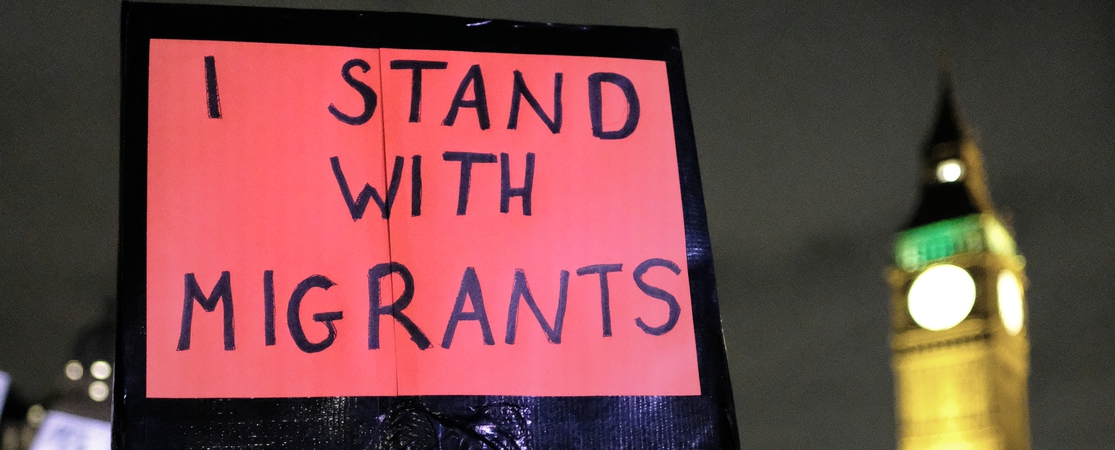Khan's proposal is an empty gesture that relies on British exceptionalism. This is why the Remain movement failed.
Last month, the mayor of London, Sadiq Khan, embarked on a trip to Brussels announcing his intention to lobby for associate European Union citizenship for Londoners. This idea, first floated in 2016 by the liberal politician and former EU Parliament Brexit coordinator Guy Verhofstadt, would entail a continuation of some EU treaty rights for Brits disgruntled by Brexit, including the ability to move to EU27 countries with full rights to work and to access healthcare and other benefits.
There is no obvious incentive for the EU to agree to this plan, which is less a serious policy proposal than a way for Khan to flaunt his Remainer credentials in advance of his mayoral re-election campaign. Nevertheless, it has sparked an interesting debate which is worth examining more closely.
Some Remainers have argued that associate EU citizenship is a proposal worth considering because it challenges the whole concept of citizenship, usually defined as rights given to an individual for belonging to a certain national community. Non-citizens, by definition, have fewer rights than citizens, with all the precarity and vulnerability that entails.
There is certainly value in pursuing political solutions that erode the concept of citizenship and its associated hierarchy of rights. But the debate around associate EU citizenship is not occurring in a vacuum. Boris Johnson’s government is presently extending its hostile environment to millions of EU immigrants, while stripping people of colour of their citizenship and deporting them to countries they have not seen since childhood—if they have ever seen them at all. To focus on the rights of British people to move freely within the EU at this juncture is to spectacularly misjudge what is currently important in debates around migration and citizenship. And it is symptomatic of a Remain movement that is still unable to conceive of an internationalism beyond rhetorical support for European institutions, no matter how regressive or undemocratic.
There were pockets of the ‘remain and reform’ movement that sought to shift the discourse onto addressing deeper-rooted, systemic issues of global inequality, which the EU plays its part in maintaining. But these campaigns never made a significant impact on the nation’s consciousness, nor on the leadership of the Remain movement. Instead, the dominant forces within the People’s Vote campaign were technocratic and neoliberal, with a corresponding paucity of strategy and of imagination.
Unable to consolidate a coherent political narrative, the Remain campaign’s self-appointed leaders failed to capitalise on the government’s attacks on liberal democracy and the judiciary. Johnson’s prorogation of parliament could have been exploited to radicalise the People’s Vote campaign and its bourgeois supporters. The political rupture caused by Brexit should have galvanised them into action. Instead, at the crucial moment, the People’s Vote campaign imploded over whether the greatest danger to the UK was indeed Brexit, or a government led by Jeremy Corbyn.
So the moment passed, and the movement failed, because building a defence against Johnson’s strategy required an acknowledgement that the deep-rooted disaffection that fuelled Brexit can only be tackled by a willingness to question the current system itself. Defenders of the status quo were singularly ill-equipped to acknowledge this, and their failure is the triumph of Johnson and his authoritarian nationalism.
Fresh from this failure, many of these same voices are now demanding exceptional rights for British citizens to roam the continent and settle wherever they wish, without reciprocal rights for others to settle here. Although many Remainers like to decry Brexit supporters as Empire nostalgists, perhaps their own view of Britain as somewhere inherently deserving of special treatment is not a million miles away from that of the Brexiteers.
In its ideal incarnation, the Remain movement should have been a political force that pushed the violence of the border to the forefront of political consciousness-building. Starting from a point of sympathy with European nationals threatened with losing their home, campaigners should have brought the wider immigration system into the discussion. There was a political opportunity for Remainers to consolidate around a defence of all migrants’ rights.
Rather than just defending free movement, there should have been campaigns amplifying resistance against detention and deportation, and opposing racist and imperialist domestic and foreign policy. But this never formed the basis of the Remain movement’s politics, and none of it is forthcoming now.
Instead, City Hall is making a notable effort to support European citizens in London to navigate Brexit as part of the ‘London is Open’ campaign. It includes promo videos and advice surgeries for EU nationals to get support with Settled Status applications. This support is of course welcome. But “London is Open” rings rather hollow considering Sadiq Khan’s ambivalent comments about the Londoners scheduled for deportation to Jamaica, or his failure to speak up against facial recognition cameras on London’s streets—another weapon most frequently deployed against Black and minority ethnic communities in the service of the hostile environment.
Khan, who is up for re-election in May, is clearly playing to the idea of London as a ‘Remain’ city. That he chooses to make these empty, performative gestures that mirror British exceptionalism, rather than to embrace the politics of solidarity and resistance, is one of the clearest indications of why ‘remain and reform’, despite its noble intentions, failed in the end.
